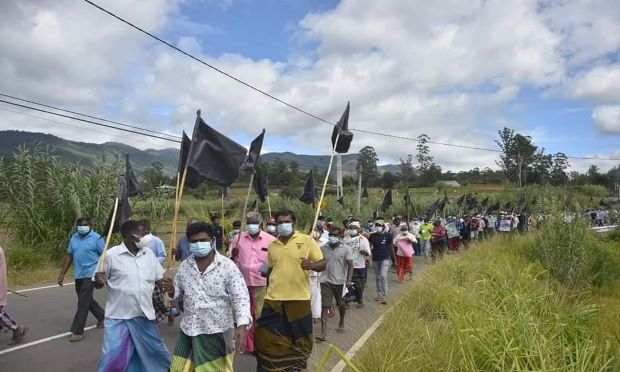For Canada, organic food is an expensive status symbol, for Sri Lanka, it’s a catastrophe
By Doug Saunders
Next time you think of reaching for the higher-priced produce on your supermarket’s ‘organic’ shelf, spare a moment’s thought for the people of Sri Lanka.
After its annual rice harvest failed, this poor island nation – whose diet is about 80% rice – in recent weeks launched a US$ 1.2-billion program of emergency food aid to a population staggering under a 22% rise in food prices. It also launched a US$ 200-million program to bail out the incomes of hundreds of thousands of rice farmers, and huge sums to import hundreds of thousands of tonnes of rice. This, in a heavily indebted country whose government income rarely exceeds US$ 10-billion, is proving ruinous, leaving it begging India, China and Iran for assistance.
This humanitarian catastrophe is the result of a single policy decision: Last April, Sri Lankan president Gotabaya Rajapaksa declared that the entire country would immediately switch to organic farming.
His reasons weren’t hard to discern: Westerners, and wealthy Asians, like to pay a premium for foods labelled ‘organic’. In recent decades, as food prices have otherwise plummeted worldwide, buying organic has become a status-affirming act of conspicuous consumption.
For Rajapaksa, it meant immediately banning all imports of fertilizer – which, he assumed, would also be cost-saving. Organic farming techniques replace fertilizer with the reuse of tillage and other composts, as well as natural fertilizers such as manure.
But rice is a particularly nitrogen-intensive crop, and even if you eliminate fertilizers, you need to use expensive inputs and tricky techniques – including flooding the paddies earlier and more often, resulting in greater water use – to replace the lost nutrients. Weeds and pests are huge threats to rice crops, and the ‘natural’ alternatives to herbicide and pesticide are difficult to implement and less effective. Even when done properly, organic rice farming produces considerably lower yields than conventional techniques. It also releases more greenhouse gases into the atmosphere.
Shortly after he ordered the change, agronomists from the Sri Lanka Agricultural Economics Association warned Rajapaksa in a letter that, even if successful, organic farming would reduce rice yields by a quarter and rice-farmer profitability by 33%, and result in even greater productivity drops in the country’s major export crops of tea and coconuts; over all, the shift would cut the size of the country’s economy by 3%. This proved to be a conservative estimate – a majority of farmers say they received no training in organic techniques, and fertilizer and pesticide alternatives could not be found.
Behind Sri Lanka’s catastrophe is the larger price of consumer fetishization of ‘organic’. Organic farming was developed, decades ago, to address a single controversy: The use of chemical inputs in agriculture, during an era when herbicides and pesticides contained menacing chemicals that lingered in the ecosystem. Organic’s lower crop yields, higher price, greater land use and, therefore, greater climate damage were considered a reasonable price to pay – and that attitude continued after the 1990s saw the adoption of new farm chemicals whose lasting harm to the environment is negligible.
Organic produce has been shown to have no nutritional or flavour advantages over conventional produce. Its ecological advantages in some crops are balanced by ecological damage caused by, for example, the heavy use of tillage, which can result in faster soil exhaustion. Other modern sustainable agricultural techniques, such as no-till farming, are considerably more ecologically beneficial and productive – but they can’t earn the ‘organic’ label.
Broadly speaking, the rise of the organic-food fetish has been bad for poor people.
You don’t need to go to South Asia to see that. Just look at the fact that every supermarket now features well-promoted shelves of foods that cost three or four times as much as the otherwise identical stuff in the lower bins. Or that TV shows and cookbooks frequently insist on organic produce, implying that you’re somehow harming your children if you do otherwise. Just as we’ve finished enjoying five decades of plummeting food prices and therefore declining poverty, we’re now sending a message to people with low incomes: If you aren’t buying these premium foods, you’re harming your family.
We’re sending a similar message to countries such as Sri Lanka. The majority of the world’s very poor people are farmers working small holdings with few resources, and the switch to less productive, and therefore more land-intensive organic techniques, is the opposite of what they need.
A country like Sri Lanka could easily triple the amount it produces per hectare; instead, it somehow found a way to cut its already low yield. Sri Lankans were sold a bill of goods by their naive leader, and we’re holding the receipts.
-Doug Saunders is international columnist for The Globe and Mail where this article was originally featured


